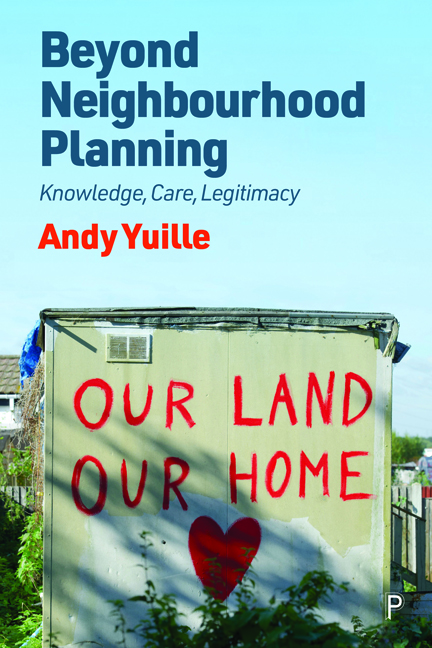Book contents
- Frontmatter
- Contents
- List of figures and table
- Acknowledgements
- Preface
- 1 Introduction: Neighbourhood planners and the turn to participation
- 2 Planning, participation and democratisation
- 3 Knowledge, politics and care: perspectives from Science and Technology Studies
- 4 Neighbourhoods, identity and legitimacy
- 5 Experience, evidence and examination
- 6 Expertise, agency and power
- 7 Care and concern
- 8 Conclusion: Neighbourhood planning and beyond
- Notes
- References
- Index
7 - Care and concern
Published online by Cambridge University Press: 20 January 2024
- Frontmatter
- Contents
- List of figures and table
- Acknowledgements
- Preface
- 1 Introduction: Neighbourhood planners and the turn to participation
- 2 Planning, participation and democratisation
- 3 Knowledge, politics and care: perspectives from Science and Technology Studies
- 4 Neighbourhoods, identity and legitimacy
- 5 Experience, evidence and examination
- 6 Expertise, agency and power
- 7 Care and concern
- 8 Conclusion: Neighbourhood planning and beyond
- Notes
- References
- Index
Summary
‘If it's supposed to be a new way of planning, it's for the planners to learn to speak like us, not the other way around. We get sucked into their world, they do and say things like this because it's what they’re used to, and then we just go along with it because they know that they know what they’re doing, even if they don’t, if you see what I mean, because they’re the experts.’
Martin (Oakley neighbourhood planning group [NPG] member, May 2017)Introduction
This chapter addresses some of the neglected things in neighbourhood planning: the affective, relational, experiential knowledges that previous chapters have shown often get excluded.
As the opening quotation from Oakley NPG member Martin articulates very eloquently, the NPGs felt that rather than neighbourhood planning leading to planners (and the planning system) engaging better with their world of lived experience, it instead drew them, the neighbourhood planners, into a situation in which they had to adopt the language, norms and conventions of a professional community of practice. And within this community, they often felt that they had to defer to the practices of the professionals, even when this conflicted with or excluded their understandings of situations, simply because of their accredited status: “they know that they know what they’re doing, even if they don’t”.
The chapter begins by describing some of the attempts that the NPGs made to engage with experiential knowledge and care for place, and the difficulties they encountered in articulating, capturing and translating them into evidence. I suggest that if a process that is intended to be driven by the community's knowledge of and care for place struggles to engage directly with those matters, then some change of approach is needed. I then draw on the concepts of matters of concern (Latour, 2004b) and matters of care (Puig de la Bellacasa, 2017) to develop a theoretical reflection on what such a change of approach might involve. I propose operationalising these concepts in the production and evaluation of evidence for neighbourhood planning.
- Type
- Chapter
- Information
- Beyond Neighbourhood PlanningKnowledge, Care, Legitimacy, pp. 201 - 230Publisher: Bristol University PressPrint publication year: 2023

